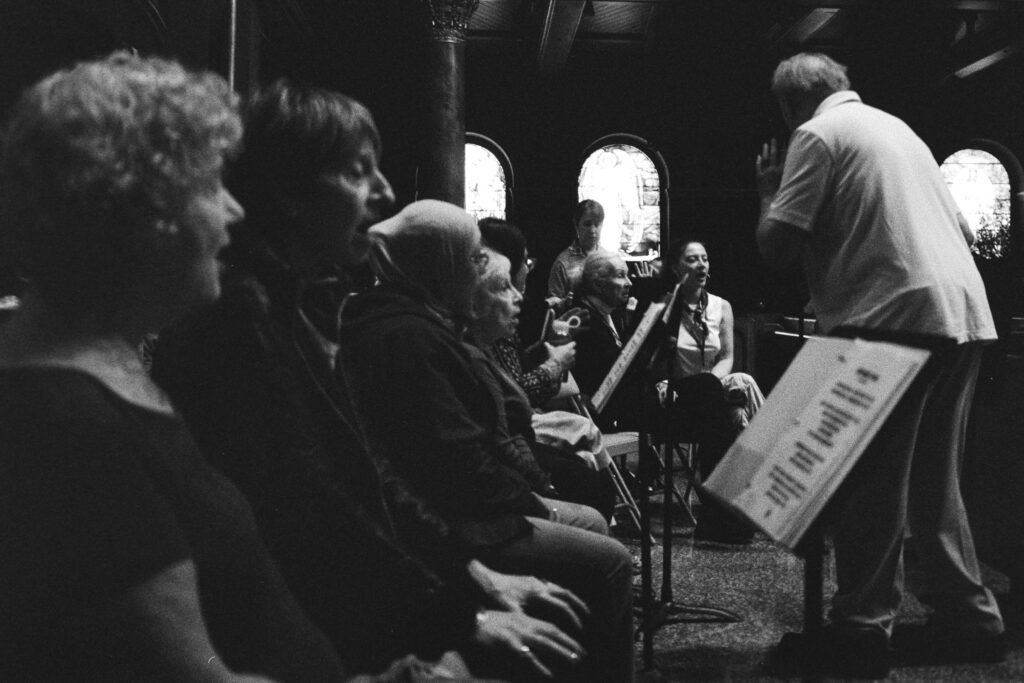Soft light filters through the stained glass of St. Michael’s Church, located on New York’s Upper West Side, creating a peaceful ambiance. The towering organ pipes stretch high toward the ceiling, creating a grand backdrop as people slowly enter the church. Among them, members of the Unforgettables Chorus arrive in pairs — mostly older individuals, guided by younger caregivers. They pick up their name tags before making their way to the front, where they take their seats.
The choir directors greet everyone with warm smiles and songbooks. Once the members are settled, the rehearsal begins. At first, the singing is soft, but as the members gain confidence, the music grows louder, more powerful. They sing together, not in competition, but in harmony, focusing on participation and relishing the joy of making music together. Shared laughs and gentle swaying to the rhythm of the songs create a sense of camaraderie and unity.
The Unforgettables Chorus, established in 2011 by Dr. Mary Mittelman at NYU Langone Health, was designed specifically for individuals living with dementia and their caregivers. The choir rehearses weekly and performs two concerts annually. They primarily sing familiar old songs, music that resonates with the members, bringing them comfort. Each rehearsal begins with the iconic song “Unforgettable,” written by Irving Gordon and famously recorded by Nat King Cole.
Tania Papayannopoulou, the music director and conductor of the chorus, explains her goal for the group: to create a space where people feel they can truly be themselves. “I wanted to build an environment where they could have a better day, a better week, by carrying the music with them,” she said. Active engagement in music — whether through singing, moving, clapping, or even snapping fingers — activates healthy neurons and promotes feelings of euphoria, according to Papayannopoulou. When the participants are in good spirits, they are better able to connect with their loved ones and share moments of joy.
Dr. Borna Bonakdarpour, a neurologist at Northwestern Medicine, explains that long-term memory of music remains intact even in the later stages of Alzheimer’s and dementia. Research from the University of Utah Health showed that music, particularly songs that hold personal meaning, can still activate the brain, even when other cognitive pathways have been compromised. Similarly, a study from the University of Toronto indicated that listening to meaningful music helped improve brain adaptability in individuals with early Alzheimer’s or mild cognitive impairment.
For members of the Unforgettables Chorus, the experience of participating in the choir has been empowering. “Music allows them to reconnect with who they are and what they’re capable of,” said Papayannopoulou.
Music has a way of breaking through the cognitive barriers of dementia, offering a form of expression and connection that transcends words. Bridget Elias, a member of the chorus, and her caregiver, Lizette Delacruz, often listen to music at their Brooklyn home after taking a walk in the park. Elias, who was diagnosed with early-onset Alzheimer’s at the age of 52, has been a part of the Unforgettables Chorus along with her husband, Townsend Davis. Together, they traveled the world after her diagnosis, fulfilling dreams they had put on hold. Despite the challenges of Alzheimer’s, Elias found great joy in the chorus.
“We just took some of those dreams and tried to live them earlier,” said Davis, recalling their travels to Greece, Italy, Costa Rica, and the Czech Republic. While Elias can no longer express her favorite activities, Davis believes she still enjoys the music. During the pandemic, the choir transitioned to virtual meetings, and though Elias’ ability to articulate her feelings has declined, the music continues to bring her happiness.
For both participants and caregivers, the Unforgettables Chorus is more than just a musical group; it’s a source of joy, connection, and empowerment in the face of dementia.



